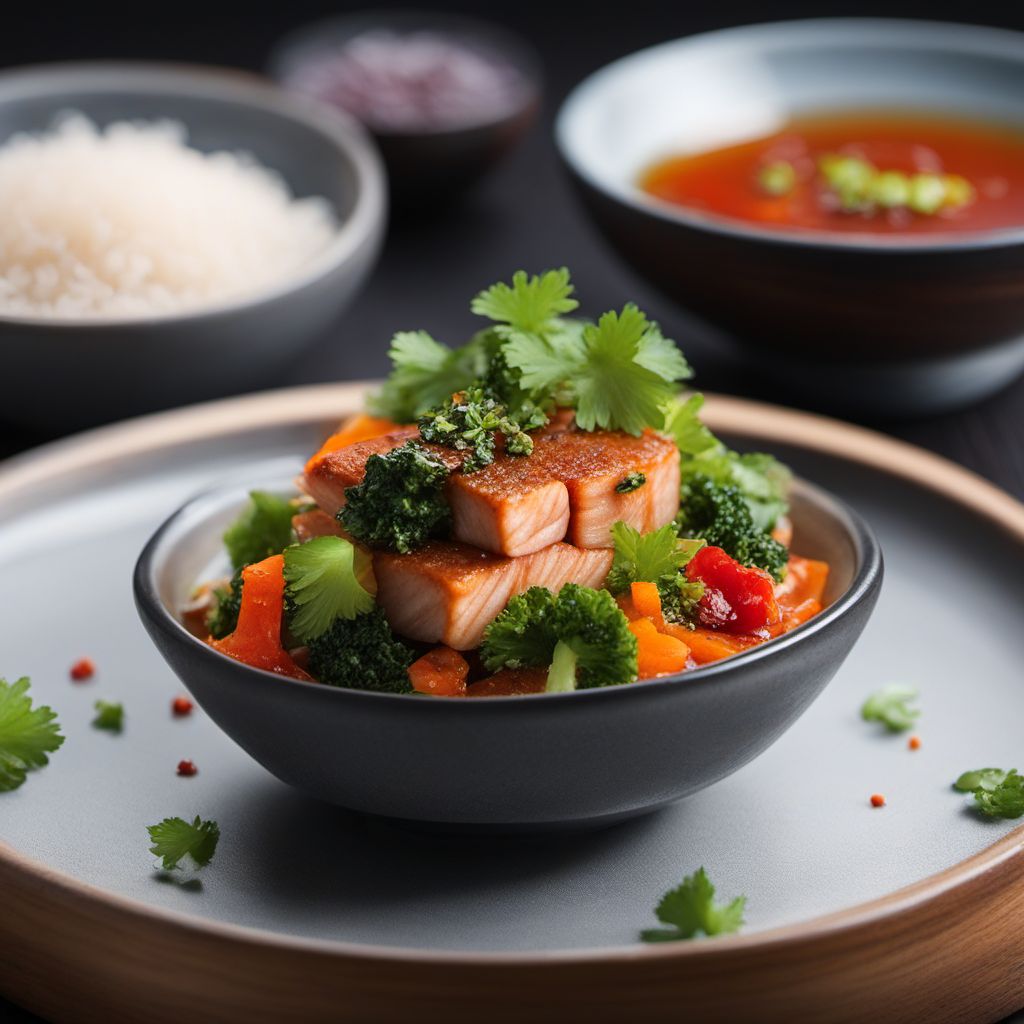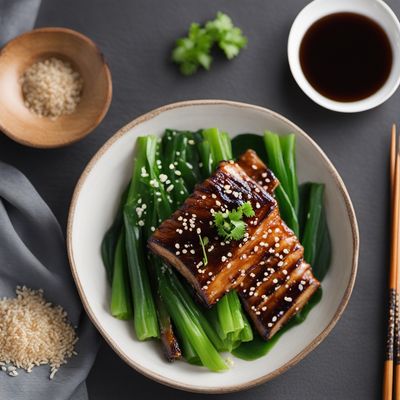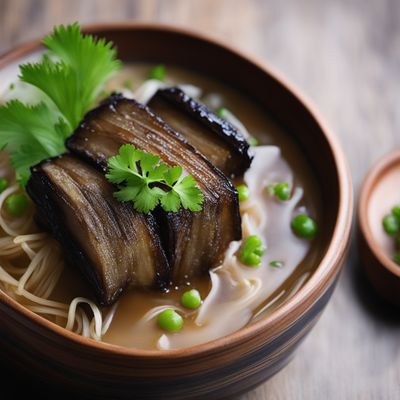
Recipe
Indian Chinese Style Oshizushi
Spicy Fusion Sushi Delight
4.7 out of 5
This recipe combines the traditional Japanese Oshizushi technique with the bold flavors of Indian Chinese cuisine. It offers a unique twist to the classic sushi, infusing it with aromatic spices and vibrant ingredients.
Metadata
Preparation time
30 minutes
Cooking time
20 minutes
Total time
50 minutes
Yields
4 servings
Preparation difficulty
Medium
Suitable for
Pescatarian, Dairy-free, Gluten-free, Low-fat, Low-sodium
Allergens
Soy, Fish (if using fish-based fillings)
Not suitable for
Vegan, Vegetarian, Paleo, Keto, High-protein
Ingredients
In this Indian Chinese adaptation of Oshizushi, the traditional Japanese ingredients are replaced with Indian Chinese flavors. The sushi rice is seasoned with Indian spices like cumin, coriander, and turmeric, giving it a distinct taste. The filling includes marinated vegetables and chicken, stir-fried with soy sauce and chili paste for a spicy twist. The sauce used for topping the sushi is tangy and slightly sweet, adding a unique flavor profile to the dish. We alse have the original recipe for Oshizushi, so you can check it out.
-
2 cups (470ml) sushi rice 2 cups (470ml) sushi rice
-
2 1/2 cups (590ml) water 2 1/2 cups (590ml) water
-
1 teaspoon salt 1 teaspoon salt
-
1 teaspoon cumin powder 1 teaspoon cumin powder
-
1 teaspoon coriander powder 1 teaspoon coriander powder
-
1/2 teaspoon turmeric powder 1/2 teaspoon turmeric powder
-
1 cup (150g) mixed vegetables (carrots, bell peppers, cabbage) 1 cup (150g) mixed vegetables (carrots, bell peppers, cabbage)
-
1 cup (150g) boneless chicken, thinly sliced 1 cup (150g) boneless chicken, thinly sliced
-
2 tablespoons soy sauce 2 tablespoons soy sauce
-
1 tablespoon chili paste 1 tablespoon chili paste
-
2 tablespoons vegetable oil 2 tablespoons vegetable oil
-
2 tablespoons vinegar 2 tablespoons vinegar
-
1 tablespoon sugar 1 tablespoon sugar
-
1/2 teaspoon salt 1/2 teaspoon salt
-
Nori sheets for garnish Nori sheets for garnish
Nutrition
- Calories (kcal / KJ): 320 kcal / 1340 KJ
- Fat (total, saturated): 6g, 1g
- Carbohydrates (total, sugars): 52g, 3g
- Protein: 16g
- Fiber: 3g
- Salt: 1.5g
Preparation
-
1.Rinse the sushi rice under cold water until the water runs clear. Drain well.
-
2.In a saucepan, combine the rice, water, salt, cumin powder, coriander powder, and turmeric powder. Bring to a boil, then reduce heat to low, cover, and simmer for 15 minutes or until the rice is cooked and the water is absorbed.
-
3.In a separate pan, heat vegetable oil over medium heat. Add the mixed vegetables and chicken slices. Stir-fry for 5 minutes until the vegetables are tender and the chicken is cooked through.
-
4.Add soy sauce and chili paste to the pan and stir well to coat the vegetables and chicken. Cook for an additional 2 minutes.
-
5.In a small bowl, mix vinegar, sugar, and salt until the sugar and salt are dissolved.
-
6.Transfer the cooked rice to a rectangular mold or a lined baking dish. Press the rice firmly to create an even layer.
-
7.Spread the stir-fried vegetables and chicken evenly over the rice layer.
-
8.Pour the vinegar mixture over the filling, ensuring it is evenly distributed.
-
9.Cover the mold with plastic wrap and refrigerate for at least 1 hour to allow the flavors to meld.
-
10.Once chilled, remove the plastic wrap and carefully invert the mold onto a cutting board. Gently tap the mold to release the sushi.
-
11.Cut the sushi into bite-sized pieces and garnish with nori sheets.
Treat your ingredients with care...
- Sushi rice — Rinse the rice thoroughly to remove excess starch before cooking.
- Mixed vegetables — Cut the vegetables into small, uniform pieces for even cooking.
- Chicken — Ensure the chicken is thinly sliced to cook quickly and evenly.
- Chili paste — Adjust the amount of chili paste according to your desired level of spiciness.
- Nori sheets — Toast the nori sheets lightly over a flame for a few seconds to enhance their flavor.
Tips & Tricks
- For a vegetarian version, replace the chicken with tofu or tempeh.
- Experiment with different vegetable combinations to suit your taste preferences.
- Serve the sushi with soy sauce, wasabi, and pickled ginger for an authentic touch.
- If you don't have a rectangular mold, you can use a lined baking dish or even shape the sushi by hand.
- Customize the level of spiciness by adjusting the amount of chili paste.
Serving advice
Serve the Indian Chinese Style Oshizushi as an appetizer or a main course. Arrange the sushi pieces on a platter and garnish with additional nori sheets and a sprinkle of sesame seeds. Serve with soy sauce, wasabi, and pickled ginger on the side.
Presentation advice
Arrange the sushi pieces in a visually appealing manner on a rectangular platter. Garnish with thin strips of nori and a sprinkle of sesame seeds. Serve with a small dish of soy sauce, a dollop of wasabi, and a few slices of pickled ginger for an elegant presentation.
More recipes...
For Oshizushi
For Japanese cuisine » Browse all
More Japanese cuisine dishes » Browse all

Ichigo daifuku
Ichigo Daifuku
Ichigo daifuku is a traditional Japanese sweet that consists of a small round mochi (glutinous rice cake) stuffed with sweet red bean paste and a...

Kingyoku
Kingyoku is a traditional Japanese dish that is perfect for any occasion. It is a savory pancake that is filled with cabbage, pork, and shrimp....

Kakuni
Braised pork belly
Kakuni is a traditional Japanese dish made of braised pork belly. It is a popular comfort food in Japan and is often served with rice and vegetables.









